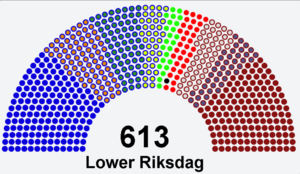Nordic Riksdag
| Riksdag | |
|---|---|
| Bicameral | |
| Type | |
Term limits | 5 years |
| History | |
| Established | 1435 |
New session started | October 29th, 2024 |
| Leadership | |
High Senator |
Oscar Merci, Reform Since October 29th, 2019 |
Leader of the Opposition |
Olaf Gustav, Old Guard Since August 17th, 2022 |
Speaker of the Upper Riksdag |
Märta Posse, Reform Since April 4th, 2023 |
Speaker of the Lower Riksdag |
Theo Edgren, Reform |
| Structure | |
| Seats |
821 Voting Members 613 Gentlemen/Ladies of the Riksdag 208 Senators |
Upper Riksdag political groups |
Reform, 23%/48 seats Nordic Union, 13.9%/29 seats National Party, 12%/25 seats Centre Party, 6.2%/13 seats Green Party, 4.8%/10 seats Honor, 5.7%/12 seats Law and Justice, 7.2%/15 seats Nuoli, 6.2%/13 seats Old Guard, 20.6%/43 seats |
Lower Riksdag political groups |
Reform, 24.9%/153 seats Nordic Union, 12%/74 seats National Party, 10.9%/67 seats Centre Party, 5.8%/36 seats Green Party, 3.7%/23 seats Liquor Party, 0.1%/1 seat Honor, 5,3%/33 seats Law and Justice, 7.1%/44 seats Nuoli, 6.6%/41 seats Old Guard, 23%/141 seats |
| Elections | |
Upper Riksdag voting system | Indirect Appointment |
Lower Riksdag voting system | Direct Appointment |
Upper Riksdag last election | October 29th, 2024 |
Lower Riksdag last election | October 29, 2024 |
Upper Riksdag next election | October 29th, 2029 |
Lower Riksdag next election | October 29th, 2029 |
| Constitution | |
| 1946 Nordic Constitution | |
The Nordic Riksdag is the legislative branch of the Nordic government. Since 1920, the Riksdag has bee a bicameral, composing of a directly appointed Lower Riksdag and an indirectly appointed Upper Riksdag. It meets in the Riksdagshuset in Stockholm. The Riksdag consists of 821 total members, with 613 Gentlemen or Ladies of the Riksdag within the Lower Riksdag and 208 Senators of the Upper Riksdag. Both houses of the Riksdag serve for 5 year terms, with a limit of 3 terms.
Structure
The Riksdag is split into two chambers - Upper and Lower - each with responsibilities and restrictions.
Upper Riksdag
The Upper House of the Riksdag is an indirectly appointed legislature, with Nordic citizens voting for political parties as opposed to individual members, with those political parties then appointing the 208 members of the Upper House via proportional representation. The Upper House of the Riksdag has several powers and restrictions, including final approval on certain appointments made by the Grand Marshal to include ambassadors, High Court Justices, and the responsibility to confirm the appointment of select ministers, along with final approval of any bill originating in the Lower House and the sole access to the Vote of No Confidence. However, the Upper House may not introduce bills related to taxation or other means of raising revenue, and all bills introduced by the Upper House must go through the Lower House.
Lower Riksdag
The Lower House of the Riksdag is a directly appointed legislature, with Nordic citizens directly voting for the individual they wish to see in office. The 613 seats of the Lower House are granted via population instead of evenly. The Lower House of the Riksdag, similar to the Upper House, has several powers and restrictions placed upon it, including the sole ability to introduce bills related to revenue and the responsibility to confirm the appointment of select ministers or for employment of select ministries. Additionally, the Lower House retains the means to initiate an investigation into the Executive Branch or the Upper House under conditions of suspected wrongdoing and to form committees for various functions to include investigation, management of the budget, or concerns of public opinion.
Parties
Reform
The Reform Party (R) is the primary center-right liberal conservative party. The party supports increased government housing construction, increased VAT, increased sin taxes, the introduction of a proportional income tax, supports the liberalization of the abortion law, is pro-renewable energy, is pro-same sex marriage and is pro-NEMOS.
The Reform Party holds 24.9% of the seats in the Lower Riksdag, or 153 total, and 23% of the seats in the Upper Riksdag, or 48 seats total.
Old Guard
The Old Guard (GG) is the primary right-wing populist and national-conservative party of the Nordic Federation. The party supports a reduced social security net, reduced environmental concerns, the expansion of both conscription and the military, economic nationalism, reinforcement of traditional values and expansion of the Grand Marshal’s powers.
The Old Guard holds 23% of the seats in the Lower Riksdag, or 141 total, and 20.6% of the seats in the Upper Riksdag, or 43 seats total.
Nordic Union
Nordic Union is the primary center-left party of the Nordic Federation, and supports policies such as renewable energy, reforestation, shift of minimum wage from ꝅ75/hour to %60 of the average wage, increasing public healthcare to %9 of GDP, building 1 million additional apartments by 2031, 12 weeks of paid newborn leave for both sexes, supports the liberalization of the abortion law and introduce workplace gender quotas.
Nordic Union (NoU) holds 12% of the seats in the Lower Riksdag, or 74 total, and 13.9% of the seats in the Upper Riksdag, or 29 seats total.
National
The National Party (N) is a center-left party of the Nordic Federation, and supports economic liberalism, Nordic entry into the Eurozone, economic deregulation, the full legalization of abortion, expansion of immigration, cut taxes by over 12%, and legalize dual citizenship.
The National Party holds 10.9% of the seats in the Lower Riksdag, or 67 total, and 12% of the seats in the Upper Riksdag, or 25 seats total.
Law and Justice
The Law and Justice Party (LOR) is a Nordic right-wing populist party, founded in 2001 as a merger between the Nordic League and Nordic United. The party supports policies such as a reduced social safety net, economic nationalism, reduced VAT taxes, the annexation of Estonia, and a reduction of both government size and the total number of Senators.
The Law and Justice Party holds 7.1% of the seats in the Lower Riksdag, or 44 total seats, and 7.2% of the seats in the Upper Riksdag, or 15 total seats.
Nuoli
Nuoli is a Nordic far-right party, refounded in 2010 after being banned in 2002 for suspected links to terrorist activities. The party supports policies such as economic nationalism, private healthcare for non ‘social citizens’, expansion of the military, a mandatory three years military service, withdrawing from NEMOS, annexation of Estonia, and illegalization of homosexuality. Nuoli Party members have also stated that ‘Russia and Belarus are waging a hybrid war against all Nords’, that Russia is ‘an existential threat to the Nordic Federation’ and compared homosexuality to ‘a plague running wild in the world’.
Nuoli holds 6.6% of the seats in the Lower Riksdag, or 41 total, and 6.2% of the seats in the Upper Riksdag, or 13 total.
Centre Party
The Centre Party (C) is a Nordic agrarian political party with liberal leanings, and supports decentralization of political power, reduced taxes for farmers and farmland, a national stipend to be established for new farmers, and increased immigration.
The Centre Party holds 5.8% of the seats in the Lower Riksdag, or 36 total, and 6.2% of the seats in the Upper Riksdag, or 13 total.
Honor
The Honor Party (Ä) is a Nordic far-right political party that largely advocates for increased authority and decreased limitations for the Grand Marshal, with policies including removing the ability for the Riksdag to impeach the Grand Marshal (I.2.6, Nordic Constitution), increased authority for the Grand Marshal over the ministries of finance, education and food, and for the Grand Marshal to be permitted to select a successor.
The Honor Party holds 5.3% of the seats in the Lower Riksdag, or 33 total, and 5.7% of the seats in the Upper Riksdag, or 12 total.
Green
The Green Party (Gr) is a green left party of the Nordic Federation, with policies such as social justice, pacifism, environmentalism, decentralization, diversity and gender quotas and anti-nuclear weapons.
The Green Party holds 3.7% of the seats in the Lower Riksdag, or 23 total, and 4.8% of the seats in the Upper Riksdag, or 10 total.
Liquor
The Liquor Party (SP) is a single issue party focused around the legalization of homebrewing alcohol, the disbanding of the government monopoly on alcohol, the relaxation of laws around the purchasing of alcohol, and reduced regulation on alcohol export.
The Liquor Party has a single seat in the Lower Riksdag, or 0.16% of the total seats.

